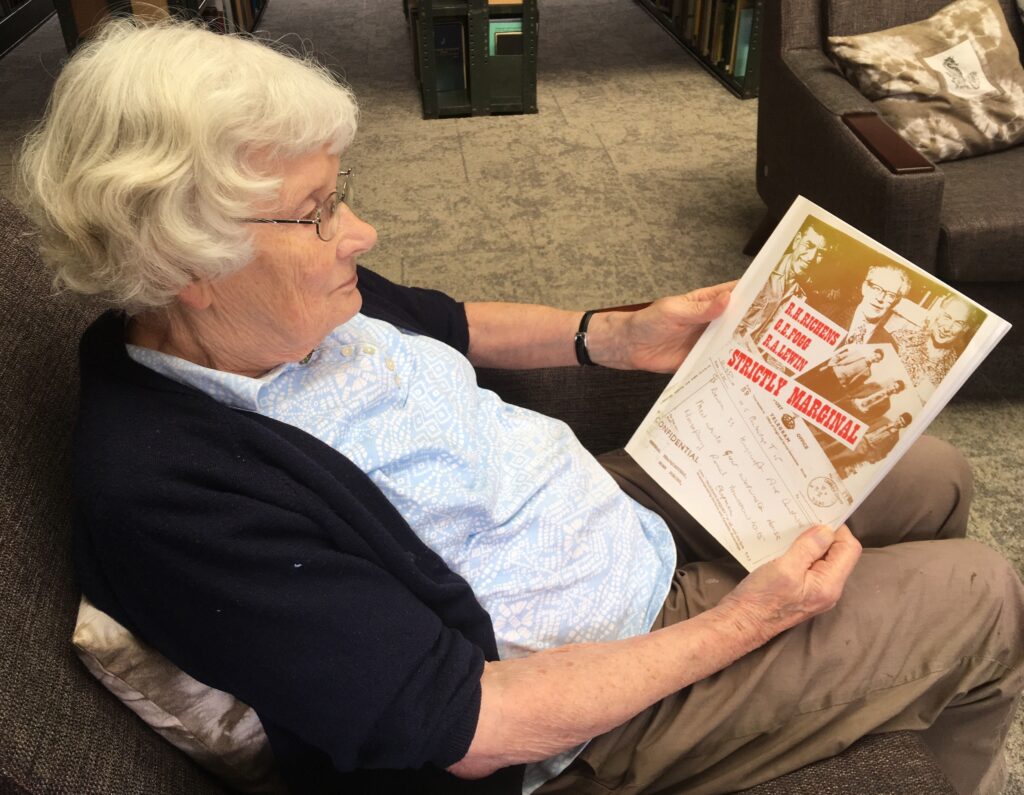
It is with deep sorrow that the Marine Biological Association announces the sad passing of Dr Eve Southward, Lankester Research Fellow at the MBA, who died peacefully on the morning of 2nd January 2023 after suffering a stroke. She was 92.
Eve was an expert on marine worms, echinoderms and hydrothermal vent fauna as well as many other invertebrate species. She was a pioneer of research on symbiosis with chemosynthetic bacteria that helped to sustain tubeworms (Pogonophora) and other hydrothermal vent fauna such as giant clams, that live in contact with reducing compounds, such as sulphide and methane. A clear highlight of her research was diving in Alvin, the deep-sea submersible operated by the Woods Hole Oceanographic Institution in the US.
Eve’s research on the impact of the Torrey Canyon oil spill off Land’s End, Cornwall, in 1967 (or certainly the impact of the clean-up operations) provided clear evidence that oil dispersants caused considerable damage to intertidal organisms, compared to simply leaving the oil to disperse naturally. This evidence forced manufacturers to modify dispersant make up, but also to consider using alterative non-chemical solutions: methods that, to this day, are instrumental in how oil spills are contained. Eve continued to work on the impacts of the Torrey Canyon through to 2016/2017 in the run up to the 50th anniversary of the spill.
Eve was never paid a salary during her official working life at the MBA (1950s to 1990), after which she continued her research career as a ‘retired’ Lankester Research Fellow (again unpaid). She worked with her husband, Professor Alan Southward (who died in 2007). Back in those early days, husbands and wives were not permitted to be employed together at the laboratory (despite Eve having a PhD). She was an amateur in the best sense of the word. She did science for love and out of curiosity. She did much ground-breaking research at a time when being a women in science was far from easy. Eve was a collaborator and source of support to Alan, as well as being an accomplished scientist in her own right. Theirs was a symbiotic relationship: Eve was often Alan’s interface with the spoken word, taking notes for him and helping with communication. Alan was completely deaf, caused by meningitis when he was 14; he could lip-read, but there were some people he couldn’t understand. Hence, Eve acted as his interpreter, his secretary and telephone-answerer. She was a huge asset to Alan in an epoch when disability was not supported.
Eve and Alan also started and conducted all the early intertidal surveys around the British Isles and Ireland together that are the foundation for the MarClim project (Marine biodiversity and Climate change), a hugely successful and pioneering project that has been assessing and predicting the influence of climatic change using intertidal rocky shore biota for over 60 years. In the 1950s, they travelled to the survey sites on the back of Alan’s BSA motorbike, and with Alan’s lack of functional inner ears for balance, Eve was certainly brave!
The COVID pandemic cut off the last two years of Eve’s scientific endeavour and social contact, although the MBA community was in touch with her throughout. Despite the pandemic, she published what was to be her last paper on deep-sea beard worms in 2021 , and she was still working on at least one manuscript that we are aware of, right to the end.
Eve will be fondly remembered at the MBA, not least for her comforting presence at every lab talk and seminar (regularly asking pertinent questions), as well as morning coffee and lunchtime breaks regaling stories of the old days with friends and colleagues. We all watched out for her, particularly on those stormy days as she battled against the wind across Plymouth Hoe to reach the MBA, often arriving dishevelled, but always cheerful, with a characteristic sparkle in her eye!
A full obituary will be published in due course.
Willie Wilson, Steve Hawkins, Paul Dando